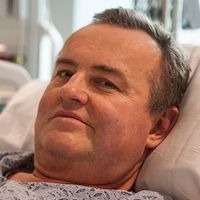Article
Surgical Milestone: Mass Gen Completes The Nation's First Penis Transplant
Author(s):
Former cancer patient Thomas Manning from Halifax, Massachusetts, is the first man in the US to undergo a penis transplant.

Former cancer patient Thomas Manning from Halifax, Massachusetts, is the first man in the US to undergo a penis transplant.
After having had part of his penis removed in 2012 following a penile cancer diagnosis, surgeons from Massachusetts General Hospital (MGH) performed the nation’s first genitourinary vascularized composite allograft (GUVCA) transplant earlier this month.
Led by Curtis Cetrulo, MD, and Dicken S.C. Ko, MD, a team of nearly 50 medical personnel, including plastic surgeons, urologists, and anesthesiologists, participated in the “marathon operation.”
The donor organ was from a deceased donor through the New England Organ Bank.
The 15-hour operation involved surgically grafting microscopic vascular and neural structures of a donor organ onto Manning’s comparable structures.
While the procedure took 15 hours, preparation for this landmark operation involved approximately 3½ years of research and collaboration across several medical divisions in MGH Transplant Center.
The possibility of successfully undertaking a GUVCA transplant manifested in 2012 after Cetrulo and the MGH team completed their first hand transplant. Both Cetrulo and Ko worked closely with the New England Organ Bank to develop key strategic surgical approaches to help patients suffering from genitourinary injuries.
The surgeons explained that the three primary goals of GUVCA transplants were:
· Reconstruct external genitalia to a more natural appearance
· Re-establish urinary function
· Potentially achieve sexual function
Ko did add that while sexual function was a goal, reproduction wasn’t — surprisingly, because of ethical issues and concerns of who the potential father could be.
Beyond medical concerns, genitalia loss can heavily impact an individual’s identity. The psychological aspects of genitourinary injuries can truly be devastating, so members from psychiatry and social work divisions are often involved in patients’ recovery processes.
Manning, 64, continues to recover well, with blood flow established to the donor organ and no signs of bleeding, rejection, or infection.
However, Manning will need to take immunosuppressing drugs for the remainder of his life to limit any chance of rejection.
Although he is still in the early stages of the “post-surgical healing process,” Manning’s doctors are “cautiously optimistic” about his recovery and anticipate that he will regain function.
He should be discharged in approximately three to four days, and will be sent to a different facility to monitor his recovery.
Ko remarked in a news release, “These proof-of-principle cases will help establish the techniques used in this procedure and will forge the path to future treatment of patients with significant pelvic and genitourinary tissue loss related to cancer, trauma, or infection. We are delighted to have taken the first steps to help those patients who have suffered silently for far too long.”
Manning had been inspired to talk to others with similar injuries. According to Cetrulo, “We hope to open this up to other patient populations, including wounded warriors.”
“Today I begin a new chapter of my life with personal hope and hope for others who have suffered genital injuries. In sharing this success with all of you, it’s my hope we can usher in a bright future for this type of transplantation,” Manning said in the news release.
Reports show there have been at least two other penis transplants across the globe. A man in Tygerberg Hospital, Cape Town, South Africa, underwent a successful transplant in 2014, while a Chinese man experienced an unsuccessful surgery in 2006.
Both Johns Hopkins Hospital and Brigham and Women’s Hospital are approved to perform the procedure.
Photo: Sam Rile/Mass General Hospital





